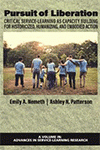
Pursuit of Liberation
Critical Service-Learning as Capacity Building for Historicized, Humanizing, and Embodied Action
Edited by:
Emily A. Nemeth, Denison University
Ashley N. Patterson, Penn State University
A volume in the series: Advances in Service-Learning Research. Editor(s): Alan S. Tinkler, Missouri State University. Todd A. Price, National Louis University.
Published 2022
The authors of this volume collectively demonstrate the importance of critical service-learning in this historic moment as we participate in, and witness ongoing struggles for justice around the world. The contributors of this volume offer guidance to educators and scholars alike who are interested in designing, participating in, and studying the potential of alliances formed through critical service-learning.
The volume emphasizes theoretical and historical foundations of critical service-learning, pressing questions facing the field, exploration of outcomes of, and ongoing challenges for the pedagogy, and design features and larger scale models of critical service-learning that can be implemented across the educational landscape of elementary, secondary, and higher education.
ENDORSEMENTS:
"This volume in the Advances in Service-Learning Research series does not disappoint. Emily Nemeth and Ashley Patterson have amassed an amazing team of authors who take readers on a rewarding journey across diverse cultural communities and educational contexts, revealing the limitations of traditional service-learning approaches in addressing issues of racial injustice. Readers of this volume will gain a greater understanding of the rapidly evolving and maturing nature of higher education service-learning pedagogy and the need to adopt more critical perspectives in the study and practice of service-learning." — Andrew Furco, University of Minnesota
"Pursuit of Liberation, conceived and written during tumultuous times in the United States, offers hope for the possibility of social justice and liberation in educational spaces. The modern-day brutal lynching of George Floyd, an African American man by a white police officer, and the COVID-19 pandemic revealed the horridness and inhumanity of a country that advertises itself as a beacon of equity and inclusion. This volume is a reminder that social justice and liberation require vigilance. The editors, Professors Nemeth and Patterson, persuade us to understand that the work of inclusion and liberation in education is complex, multidisciplinary, continuous, and iterative. Most importantly, they convincingly assert that communities and educational institutions need to take bold steps toward a more just, hopeful, and loving world through critical service learning." — Shirley Mthethwa-Sommers, University of Mpumalanga
CONTENTS
Introduction, Emily A. Nemeth and Ashley N. Patterson. SECTION I: BECOMING ROOTED: STRENGTHENING THE FOUNDATION OF CRITICAL SERVICE-LEARNING. Social Movement Building as Critical Service-Learning, Joanne Tien. Womxn of Color’s Community Engagement in College: The Role of Family in Defining and Sustaining Community-Engaged Service, Gema Cardona. A Call for a Framework that Disrupts Anti-Black Racism: A Space for Integrating and Expanding Critical Service Learning in Higher Education, Nicole Webster. SECTION II: CRITICAL CARTOGRAPHY: USING DECOLONIZING TOOLS TO MAP THE LANDSCAPE OF CRITICAL SERVICEL EARNING. Weeding for Social Justice, Colleen Rost-Banik and Ulla Hasager. Balancing in a Whirlwind: The Influence of International Service-Learning on Preservice Teachers’ Movement Toward Humanizing Pedagogy, Meagan A. Hoff, Kristie O’Donnell Lussier, and Lori Czop Assaf. Undergraduate Service Learning as a Context for Exploring the “Institutional Void” of Higher Education, Diana Arya, Alexandria Muller, John Cano, Faith Hyun, Mallory Rice, and Devon Christman. SECTION III: DIGITAL (RE)DESIGN: EXPLORING THE POTENTIAL OF CRITICAL eSERVICE-LEARNING. Crafting Critical Service-Learning in Online Spaces: Critical eService-Learning, Jean Strait. Integrating the Socially Homeless through the Online Teaching and Learning Environments via the Implementation of Critical eService-Learning, Anna Zak and Christine Angel. Can Empathy Go Virtual? Creating Authentic Connections Through Critical eService-Learning Design, Suzanne Ehrlich, Amanda Hall, Christian Winterbottom, and Michelle Bartlett. SECTION IV: BUILDING CAPACITY: MODELS FOR EMBEDDING ENGAGEMENT ACROSS SCALES. Lessons from the Intersections: Participatory and Emergent Knowledge Production in Critical Service-Learning, Maurice Stevens. Reckoning with (Recent) History: Reparatory Service Learning for Transformative Change, Alexios Rosario-Moore and Editha Rosario-Moore. Towards a Social Justice Model for Service-Learning: A Practitioner Inquiry, Julie Jaynes-Pacheco. Critical Service-Learning Amidst Conflict: Tensions and Opportunities for Peacebuilding in Divided Societies, Laura Fonseca and Lina Trigos-Carrillo. SECTION V: FROM THEORY TO EMBODIMENT: EXPLORING DESIGN FEATURES OF EFFECTIVE CRITICAL SERVICE-LEARNING PROJECTS AND COURSEWORK. Lessons on Transformative Reflection: Practitioner Research on Redesigning Reflection in Critical Service-Learning, Raquel Wood. Adopting Cultural Humility to Humanize Critical Service-Learning in Teacher Education, Darren Lund. “It Takes a Village”: The Big Buddy Program Parents’ Perspectives, Ted Kesler and Karla Manning.
-
Paperback978-1-64802-862-5
Web price: $62.04 (Reg. 72.99)
-
Hardcover978-1-64802-863-2
Web price: $89.24 (Reg. 104.99)
- eBook978-1-64802-864-9

- EDU015000 - EDUCATION: Higher
- EDU059000 - EDUCATION: Teacher & Student Mentoring
- EDU029000 - EDUCATION: TEACHING METHODS & MATERIALS: General
-
 Educating Teachers and Tomorrow’s Students through Service-Learning Pedagogy
Educating Teachers and Tomorrow’s Students through Service-Learning Pedagogy
-
 Service-Learning Pedagogy
How Does It Measure Up?
Service-Learning Pedagogy
How Does It Measure Up?
-
 Service-Learning to Advance Access & Success
Bridging Institutional and Community Capacity
Service-Learning to Advance Access & Success
Bridging Institutional and Community Capacity
-
 Service‐Learning to Advance Social Justice in a Time of Radical Inequality
Service‐Learning to Advance Social Justice in a Time of Radical Inequality
-
 Taking eService-Learning to the Next Level
Models and Tools for Next Generation Implementation
Taking eService-Learning to the Next Level
Models and Tools for Next Generation Implementation
-
 Transforming Teacher Education through Service-Learning
Transforming Teacher Education through Service-Learning
-
 Understanding Service-Learning and Community Engagement
Crossing Boundaries through Research
Understanding Service-Learning and Community Engagement
Crossing Boundaries through Research

